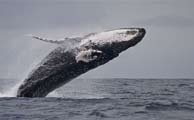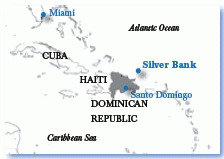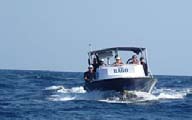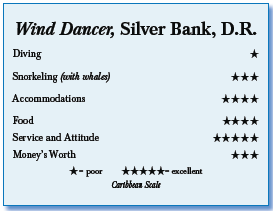Silver Bank, Dominican RepublicContents of this Issue: Silver Bank, Dominican Republic The Problem with Online Dive Logs Can You Name Your Price for Dive Gear? Dive Operator Sues ScubaBoard and John Does Dive Photos: Compact or Full Frame? Editorial Office: Ben Davison Publisher and Editor Undercurrent 3020 Bridgeway, Suite 102 Sausalito, CA 94965 swimming with humpbacks: sometimes exciting but worth the boredom? from the April, 2010 issue of Undercurrent
Dear Fellow Diver: Each year between early February and mid-April, up to 5,000 North Atlantic humpback whales migrate to Silver Bank, a 300-square-mile portion of the 1,000-square-mile Marine Mammal Sanctuary in the Dominican Republic. For eight weeks, Conscious Breath Adventures runs whale expeditions, chartering the Peter Hughes Sun Dancer II, which ordinarily operates in Belize. I was excited last November when I booked my February trip. But when mid-January rolled around, I was not looking forward to going. My reluctance had a lot to do with the devastation in Haiti. Substantial relief was getting to Haiti through the Dominican Republic, and I didn’t want to be taking up luggage space on a plane carrying relief supplies. With the adjacent country in dire straits, going to the D.R. for fun just didn’t feel right.
Then two weeks out, I received the dreaded waiver and release form from Peter Hughes, with instructions to sign and return immediately. (And if I didn’t, then what?) I thought about what I had read in Undercurrent concerning several divers’ experience with release forms and considered challenging the negligence clauses. Hmmm. A week later, a second waiver and release arrived from Conscious Breath Adventures, along with its trip information. I knew the whale trip was strictly snorkeling with no scuba offered but the preparation material was written for people who don’t even know how to snorkel. That added to my waning interest. Oh well, the trip was paid for, so I left as scheduled but without much enthusiasm.
We spent the first morning in a lengthy orientation and learning “The Silver Bank Ten Commandments,” a combination of the Marine Sanctuary and Conscious Breath’s rules for swimming with humpbacks. Do not splash. Keep fins below the water. Swim smoothly and calmly. Follow the guide. Stay together as a group. Don’t position yourself over the whales. Breathe gently and become a “jellyfish” to attract the whales’ curiosity. Don’t get behind the tail flukes. Don’t swim directly at a whale. And never reach out and try to touch one. Although it wasn’t one of the written commandments, there was an 11th: Stay on the surface, and no free diving. Then we all got into our wetsuits to practice quiet entries so that Gene Flipse of Conscious Breath Adventures, assisted by Jeff Pantukhoff of The Whaleman Foundation, could test our skills in using a snorkel, clearing a mask and swimming without splashing. Novices often come on these whale trips and orientation is geared to those without experience. Gene then laid out the routine: into the skiffs at 8:15 a.m.; hunting for or in the water with whales until 11:30; return to the boat for lunch at noon; into the skiffs again at 1:15 p.m., searching and swimming with whales until 5:30; then back to the boat for a sundowner at 5:45. I was facing more than three captive hours in the morning and four in the afternoon encased in my wetsuit. That would be okay if most of that time was spent in the water, but it wasn’t. On the first afternoon, the skiffs took us out three miles hunting for whales. We observed plenty of spouts, breaches, flukes and backs, but Gene didn’t want us in the water until he determined the situation was right, preferably with a mom and new calf. We were all on the lookout for four hours but never made it into the water. The next morning, it was the same -- looking but no swimming. This was getting boring. Finally, the second afternoon produced an opportunity about three hours into the search: an adult male and female, both more than 40 feet long, sleeping but coming to the surface to breathe. We got in the water for a good look. However, the experience was marred by Roger, a “me firster” with a big camera who pushed the rest of us around in the water. He also ignored the rules against free diving and swimming directly at the whales. Things picked up one afternoon when, after following a mom and calf from in the skiff for an hour, we were able to get in the water with a 50-foot singing humpback. The sound actually vibrated my body, which was exhilarating!
Fellow passengers Bud, Diane, Chuck and Laura had taken several whale trips in Tonga, aboard the Nai’a, and smugly compared them. In Tonga, the mother boat followed a mile or two behind the skiffs so that it was easy to get back to it between whale encounters; at Silver Bank, the mother boat remains at anchorage. In Tonga, upon sighting whales, it was often possible to get in the water from the big boat; that’s not an option at Silver Bank. In Tonga, because the big boat was live, it was able to cover many miles of the area in search of whales; at Silver Bank, the skiffs could only manage three or four miles from the big boat. In Tonga, skiffs were fast and could get to a sighting quickly; at Silver Bank, speed is limited by Marine Sanctuary rules and skiffs averaged three knots. In Tonga, there were several sightings and opportunities to get in the water each morning; at Silver Bank, we were lucky to get one sighting, and none for four out of nine opportunities. In Tonga, free diving with the whales enhanced photographic opportunities; at Silver Bank, free diving is prohibited. In Tonga, it was also possible to dive local reefs; diving is not permitted on Silver Bank (nor would I want to, as the reefs are dead and there is a paucity of marine life). Skiff drivers John and CNN were skilled at keeping bumps, chop and spray to a minimum, but three or four hours in the skiff without getting in the water was pretty boring, downright uncomfortable and hard on the bladder, particularly for Chuck and Bud, the only guys in their 70s, who were always lobbying for a “comfort” stop. Even being in the water with whales could be boring. Lying on the surface for half an hour watching sleepers at 60 feet through murky water and waiting for them to surface, only to immediately descend again to sleep, could be classified as “swimming with the whales,” I suppose, but it was more accurately “whale observation,” not the encounters I was anticipating. At least we had some fun on the skiffs. Three or more males fighting over one female are called a rowdy group. We weren’t going into the water with the rowdies, but were hoping to observe them up close. As we approached one rowdy group, it calmed down so we hung around. Ben suggested hurling whale insults to rile them up again and yelled, “Your mother looks like a dolphin!” The insult worked, but not the way we wanted -- they quickly moved off. We also passed the time telling diving stories. Bud had the most, but Roger won with his tale of being lost in the Maldives and drifting for five hours until rescued. In the evenings, Gene lectured about humpbacks and their behavior. We learned how the markings distinguish them, that adult males ranging from 49 to 52 feet are smaller than females at 52 to 56 feet, and about Silver Bank and humpback migration. Jeff showed videos of his research on humpback social sounds; he was among those instrumental in preserving San Ignacio Lagoon in Baja as a sanctuary for grey whales. Chef Jerry prepared outstanding meals, and galley assistant Barbara served them graciously. Dinners were elegant, four-course, sit-down affairs, complete with table linen and wine. I dined on entrees such as pan-seared fish and curried chicken, accompanied by tasty soups, crisp salads, fresh vegetables and just-baked bread. Late afternoon sundowners, complete with creative appetizers, were well attended. At one, Ben consumed a couple of double rums followed by several glasses of wine with dinner. He promptly fell asleep and awoke the next morning with his fingernails and toenails painted iridescent blue. He accused Kathy of having done the deed -- her nails were the same blue--but she swore her polish fell into the hands of Grant, Ben’s trip companion. For the rest of the week, Kathy and Grant kept devising new ways to prank each other and it was all pretty funny, especially when Grant put on his booties one morning to find them filled with ripe bananas (retaliation for having sewed Kathy’s wetsuit sleeves closed).
Although swimming with the whales was managed the only way it can possibly be handled at Silver Bank, and there were moments of exhilaration and a few good photos, I was mostly a bored, uncomfortable captive for hours on the skiff, and rather disappointed with the whole experience. If I ever want to try swimming with humpbacks again, I think I’ll book a trip to Tonga. --S.M. Note from Ben: We received a reader report from Ted Kern (Dallas, TX) who took the Turks & Caicos Aggressor to Silver Bank in March and reports equally strict rules. “Entry in the water was tightly controlled by the crew, they no longer allow you to free dive with the whales. To have an in-water encounter, there had to be a mother asleep below, with a baby coming up for air. The baby had to even descend back down to Mom before we could enter the water. Several times, we would get close to a couple that were moving slowly and spending lots of time on the surface, but we were not able to get in the water with them. In short, we were on Zodiacs for a total of 36 hours but spent 10 minutes in the water! What a difference from our last trip to Silver Bank in 2003, when we were in the water at every possible opportunity.“ Kern believes the changes are due to an incident in 2007, when two snorkelers, also aboard the T&C Aggressor, were struck by a whale’s tail after bumping into her calf. A current moved Randy and Gwen Thornton from Utah closer than intended, pushing them right into the whales. One tail flip hit Gwen in the back and sent her sailing 20 feet, the other gave Randy a broken leg. The incident made news after Randy was interviewed on Good Morning America- - and apparently changed the rules at Silver Bank since. “For the price you pay, you might as well go to Hawaii and do a whale-watching tour,” says Kern.
|

I want to get all the stories! Tell me how I can become an Undercurrent Online Member and get online access to all the articles of Undercurrent as well as thousands of first hand reports on dive operations world-wide
| Home | Online Members Area | My Account |
Login
|
Join
|
| Travel Index |
Dive Resort & Liveaboard Reviews
|
Featured Reports
|
Recent
Issues
|
Back Issues
|
|
Dive Gear
Index
|
Health/Safety Index
|
Environment & Misc.
Index
|
Seasonal Planner
|
Blogs
|
Free Articles
|
Book Picks
|
News
|
|
Special Offers
|
RSS
|
FAQ
|
About Us
|
Contact Us
|
Links
|
3020 Bridgeway, Ste 102, Sausalito, Ca 94965
All rights reserved.


 As it turned out, my fellow passengers aboard
-- four German, one French, two from China and 10
Americans -- were all certified divers who booked
directly with Peter Hughes and learned later that
Conscious Breath Adventures was in charge. We
were welcomed aboard by Captain James and First
Officer Marnie, and shown to our cabins. I had
been on Sun Dancer II when it was new in the
water back in 1996, and it’s a very comfortable,
sturdy and well-run boat. My cabin was clean
but showed signs of deferred maintenance. I had
asked for a king-size bed but when the twins were
pushed together, the cabin got tight, causing an
inconvenient squeeze between bed and bathroom.
As it turned out, my fellow passengers aboard
-- four German, one French, two from China and 10
Americans -- were all certified divers who booked
directly with Peter Hughes and learned later that
Conscious Breath Adventures was in charge. We
were welcomed aboard by Captain James and First
Officer Marnie, and shown to our cabins. I had
been on Sun Dancer II when it was new in the
water back in 1996, and it’s a very comfortable,
sturdy and well-run boat. My cabin was clean
but showed signs of deferred maintenance. I had
asked for a king-size bed but when the twins were
pushed together, the cabin got tight, causing an
inconvenient squeeze between bed and bathroom.
 I didn’t have much luck communicating
with two of the Germans. Gertrud
understood little English but her husband,
Edgar, was adept at carrying on
two conversations at once, one with me
in English and the other with Gertrud,
translating what I had just said. Sandra,
Marilyn, Kathy, Ben and Grant laughed
a lot and loudly at private jokes and
their raucous laughter throughout the
salon not only kept things lively but
always had me wondering what I was missing.
Ernest and Lia, from Shanghai, were
friendly but while Lia was quiet, Ernest
was quite the conversationalist, especially
at sundowners when he would light
up a big cigar. One day after hours in
the skiff without getting in the water,
Ben endeared himself to the three ladies
aboard by opining that the lack of action was because women were present. Then on the
last afternoon, with Laura and Lia aboard and despite Ben’s assessment, we experienced
the best encounter of the trip -- a spectacular four minutes in the water with a 55-
foot-long female showing off her 20-foot-long baby. Ben insisted his remark was merely
droll humor but the women weren’t moved.
I didn’t have much luck communicating
with two of the Germans. Gertrud
understood little English but her husband,
Edgar, was adept at carrying on
two conversations at once, one with me
in English and the other with Gertrud,
translating what I had just said. Sandra,
Marilyn, Kathy, Ben and Grant laughed
a lot and loudly at private jokes and
their raucous laughter throughout the
salon not only kept things lively but
always had me wondering what I was missing.
Ernest and Lia, from Shanghai, were
friendly but while Lia was quiet, Ernest
was quite the conversationalist, especially
at sundowners when he would light
up a big cigar. One day after hours in
the skiff without getting in the water,
Ben endeared himself to the three ladies
aboard by opining that the lack of action was because women were present. Then on the
last afternoon, with Laura and Lia aboard and despite Ben’s assessment, we experienced
the best encounter of the trip -- a spectacular four minutes in the water with a 55-
foot-long female showing off her 20-foot-long baby. Ben insisted his remark was merely
droll humor but the women weren’t moved. Diver’s Compass: I spent $3,145 for the 7-day trip, which did not
include transfers to and from the boat, or dinner on the last night
. . . We had a couple of partially sunny days but mostly wind,
clouds and rain showers, which hampered photography . . . Water temperature
was consistently 77 degrees, and air temps ranged from
70 to 80 degrees; visibility was poor, just 15 to 30 feet . . .
Continental flies to Puerto Plata through Newark; Delta flies through Atlanta . . . Three boats have permits to bring passengers to Silver Bank: Sun Dancer
II, Turks & Caicos Explorer II and Turks & Caicos Aggressor; all three were there and
they remained moored . . . Wine, beer and soft drinks are complimentary; those who
wanted hard liquor brought their own . . . The only extra charges are purchases from
the boutique and crew tips . . . Website:
Diver’s Compass: I spent $3,145 for the 7-day trip, which did not
include transfers to and from the boat, or dinner on the last night
. . . We had a couple of partially sunny days but mostly wind,
clouds and rain showers, which hampered photography . . . Water temperature
was consistently 77 degrees, and air temps ranged from
70 to 80 degrees; visibility was poor, just 15 to 30 feet . . .
Continental flies to Puerto Plata through Newark; Delta flies through Atlanta . . . Three boats have permits to bring passengers to Silver Bank: Sun Dancer
II, Turks & Caicos Explorer II and Turks & Caicos Aggressor; all three were there and
they remained moored . . . Wine, beer and soft drinks are complimentary; those who
wanted hard liquor brought their own . . . The only extra charges are purchases from
the boutique and crew tips . . . Website: 